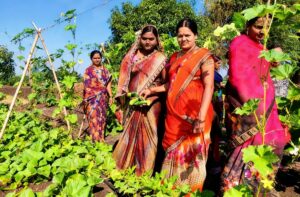by Nusrat Jahan, Muhiuddin Faruquee, and Mohammad Rafiqul Islam
The Haor wetlands in northeastern Bangladesh stretches across the horizon, playing a critical role in national rice production. Spanning the districts of Habiganj, Sunamganj, Kishoreganj, Netrokona, Moulvibazar, Sylhet, and Brahmanbaria, the Haor basin supports large-scale cultivation of Boro rice during the dry season.
These low-lying marshlands contribute 25% of the country’s total Boro rice production and 15% of its annual rice output (BBS, 2023). In this region, rice is the primary livelihood for millions and a key component of national food security.

Early-season flash floods are emerging as a major threat to Boro rice production in Bangladesh’s Haor wetlands, disrupting the traditional agricultural cycle and endangering national food security. Once a predictable seasonal challenge, these floods now arrive as early as the first week of April, submerging fields before harvest and wiping out months of labor in hours.
For generations, farmers have traditionally followed a predictable cycle of planting and harvesting rice based on the natural seasonal patterns of rain and flooding in the Haor wetlands to grow Boro rice, using more than 80% of the land for this crop. However, this natural rhythm is now being disrupted. Floods, which once came later in the season, now arrive much earlier due to unpredictable rainfall and climate change. Fields that were once full of rice are now flooded, leaving farmers with no harvest and significant losses. The balance between the land and rain that has supported farming for centuries is at risk. As the floods increase, the need for a solution becomes more urgent.
A Looming Crisis: The Need for Change
For decades, farmers in the Haor basin have relied on BRRI dhan28 and BRRI dhan29, rice varieties with growth durations of 140-160 days. However, with floods arriving earlier, these varieties no longer guarantee a harvest. The solution? A new generation of rice, one that matures faster, withstands colder temperatures and escapes the deadly clutches of early flooding.


To answer this urgent call, the Development of Short-Duration Cold-Tolerant Rice Varieties for the Haor Areas of Bangladesh project was launched. Funded by the Krishi Gobeshona Foundation (KGF) and spearheaded by the International Rice Research Institute (IRRI) in collaboration with the Bangladesh Rice Research Institute (BRRI), this initiative aims to revolutionize rice cultivation in the Haor wetlands.
Science Meets Survival: The Search for Climate-Resilient Rice
The goal is clear: develop high-yielding, short-duration rice varieties that can withstand the cold at both the seedling and reproductive stages, with a growth duration of 120-140 days and a yield potential of 6-7 t/ha. This project is not just about adapting to climate change, it’s about staying ahead of it.
By introducing these improved varieties, the project will:
- Reduce crop losses by allowing rice to be harvested before the early-season floods.
- Strengthen food security for millions of people in Bangladesh.
- Improve farmer incomes and livelihoods by ensuring more stable harvests.
- Enhance resilience against climate-induced agricultural shocks.
- Generate critical data and insights into rice breeding and market systems in the Haor region.
Beyond Agriculture: The Haor Ecosystem and Its Future
While rice farming is at the heart of this initiative, the project’s impact extends far beyond. The Haor wetlands serve as natural buffers against floods, droughts, and extreme weather events. These ecosystems provide freshwater, fisheries, and biodiversity that are crucial to Bangladesh’s ecological health. However, climate change, human encroachment, and environmental degradation pose a significant threat to their very existence. According to global studies, wetlands are disappearing three times faster than forests, and Bangladesh is no exception.
By promoting sustainable rice farming, IRRI and its partners are ensuring that agricultural progress does not come at the cost of environmental degradation. Protecting the Haor wetlands means securing both livelihoods and biodiversity for future generations.
The Economic Ripple Effect: Strengthening the Nation’s Food Security
Bangladesh is one of the world’s top rice-producing nations, yet it remains vulnerable to food shortages due to climate-induced disasters. The Haor region plays a crucial role in the nation’s agricultural economy, and the loss of even one season’s harvest can have devastating consequences, not just for farmers but for national food stocks and market stability.
With 30,000 breeding lines under development, the project is paving the way for at least two breakthrough rice varieties that will secure the country’s food supply, stabilize rice prices, and mitigate hunger. Ensuring that farmers in Haor districts have access to these climate-smart seeds will strengthen the entire rice value chain, from production to distribution.
IRRI’s Commitment: A Future Rooted in Innovation and Hope
IRRI has long been at the forefront of rice research and innovation, working globally to enhance food security and climate resilience. In Bangladesh, IRRI’s work in the Haor wetlands aligns with its broader mission to develop sustainable, high-yield rice varieties that withstand climate extremes. Through collaborations with national research institutions like BRRI, IRRI continues to drive agricultural transformation, equipping farmers with the tools, technology, and knowledge they need to thrive in an uncertain future.
As Bangladesh continue to fight against the floods, IRRI and its partners are ensuring that the country not only endures these challenges but also overcomes them. The future of the Haor region, its people, and its wetlands depends on innovation, collaboration, and unwavering commitment. And with this project, the journey towards a resilient, food-secure Bangladesh has already begun.
The Promise of Tomorrow
For the farmers battling against time and tide in Bangladesh’s Haor wetlands, the promise of short-duration, cold-tolerant rice is more than just an agricultural breakthrough, it is a beacon of hope. With each seed sown, they are not only securing their own futures but also contributing to a national effort to combat food insecurity, strengthen the economy, and protect the environment. Through cutting-edge rice breeding and sustainable farming solutions, IRRI and its partners are not only safeguarding Bangladesh’s food security but also ensuring that the Haor wetlands continue to be a source of life and prosperity.






